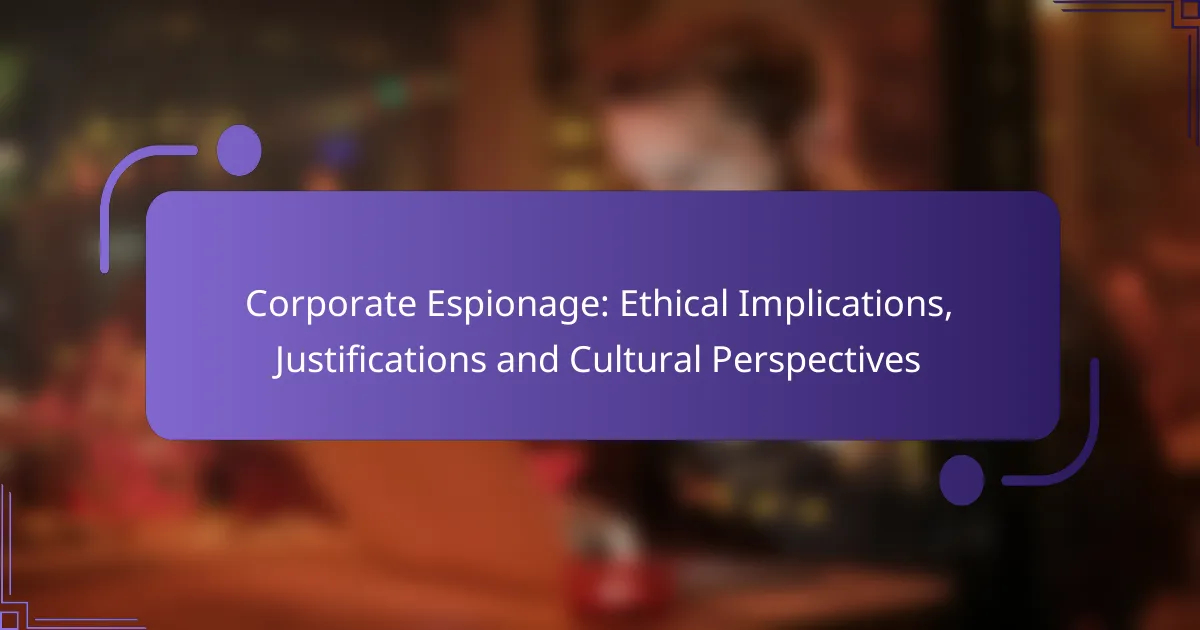Corporate espionage raises complex ethical questions regarding trust, integrity, and fairness within the business landscape. While some argue that it is a necessary tactic for gaining competitive advantage, the justifications for such actions often clash with moral standards and legal boundaries. Additionally, cultural perspectives significantly influence how different societies view the ethics and acceptability of espionage, leading to varied interpretations and practices across the globe.
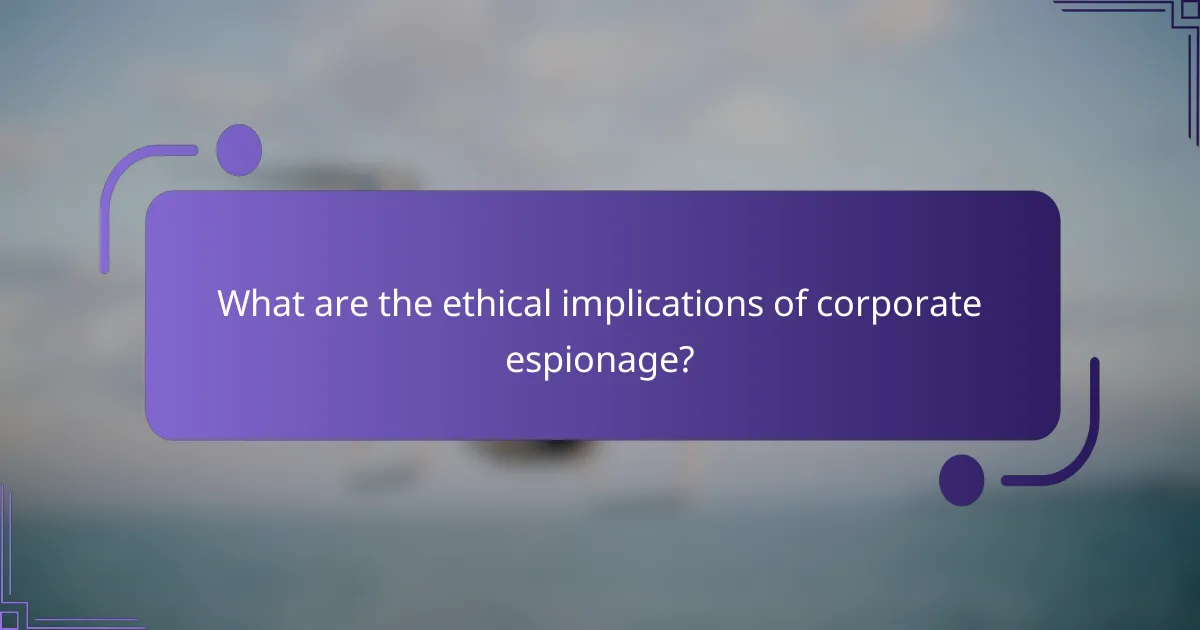
What are the ethical implications of corporate espionage?
The ethical implications of corporate espionage revolve around the breach of trust, the potential harm to corporate culture, and the legal ramifications that can arise from such actions. Engaging in espionage raises significant moral questions about integrity, fairness, and respect for competitors.
Violation of trust
Corporate espionage fundamentally violates the trust that is essential for healthy business relationships. When organizations engage in spying, they undermine the principles of honesty and transparency, which can lead to a toxic environment both internally and externally.
This breach of trust can result in long-lasting damage to reputations, making it difficult for companies to rebuild relationships with clients, partners, and even employees. Trust is a cornerstone of successful business operations, and its violation can have ripple effects across the industry.
Impact on corporate culture
The practice of corporate espionage can significantly alter a company’s culture, fostering an atmosphere of suspicion and fear. Employees may feel compelled to engage in unethical behavior themselves, believing that such actions are necessary for survival or advancement within the organization.
Moreover, a culture that tolerates or encourages espionage can lead to high turnover rates, as employees may seek out workplaces that prioritize ethical standards and integrity. Companies must actively promote ethical behavior to counteract the negative impacts of espionage on their culture.
Legal consequences
Engaging in corporate espionage can lead to severe legal consequences, including civil lawsuits and criminal charges. Many countries have strict laws against industrial espionage, and violations can result in hefty fines or imprisonment for individuals involved.
Companies found guilty of espionage may face significant financial penalties, loss of intellectual property, and damage to their market position. It is crucial for businesses to understand the legal landscape and the potential repercussions of unethical practices to avoid these pitfalls.
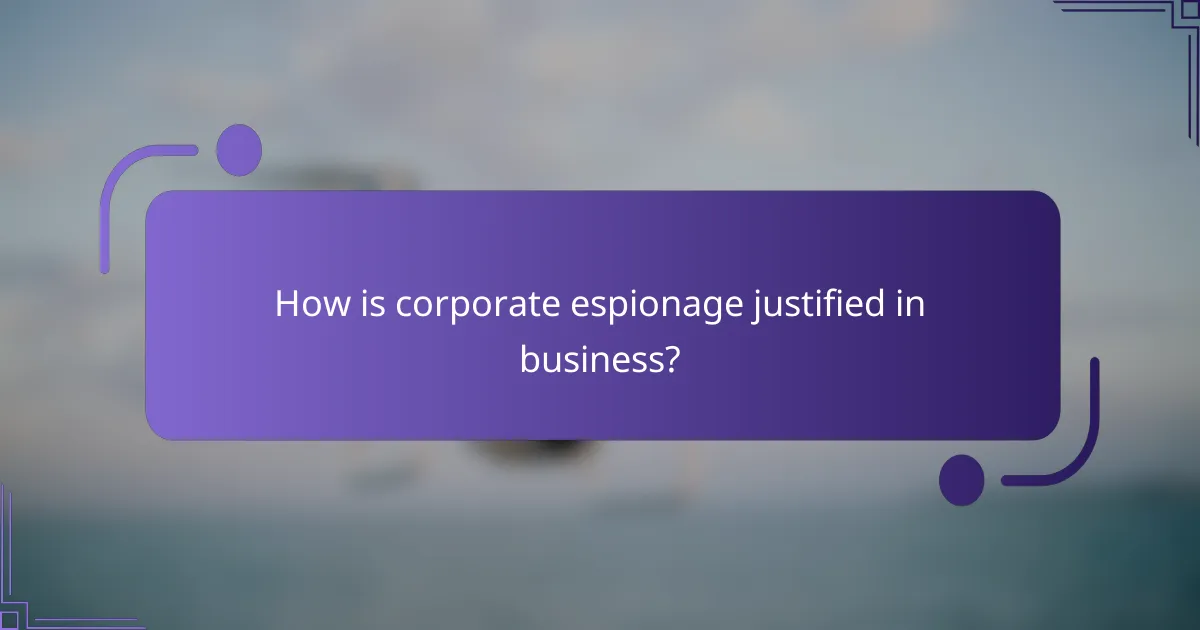
How is corporate espionage justified in business?
Corporate espionage is often justified in business as a means to gain insights into competitors’ strategies and operations. Companies may argue that such practices are necessary for maintaining a competitive edge and ensuring long-term profitability.
Competitive advantage
Companies frequently justify corporate espionage by emphasizing the need for a competitive advantage. By acquiring confidential information about competitors, businesses can identify market gaps, innovate products, and optimize pricing strategies. This practice can lead to significant market share increases and improved profitability.
However, the ethical implications of these actions must be considered. Engaging in espionage can damage a company’s reputation and lead to legal consequences, especially if it violates laws or regulations regarding trade secrets.
Market intelligence
Market intelligence is another justification for corporate espionage. Firms may argue that gathering information about competitors’ product launches, pricing strategies, and customer feedback is essential for making informed business decisions. This intelligence can help companies adapt quickly to market changes and consumer preferences.
While gathering market intelligence is a common practice, it is crucial to distinguish between ethical research methods and unethical espionage tactics. Companies should focus on legitimate means of obtaining information, such as market reports and surveys, to avoid potential legal repercussions.
Cost-benefit analysis
A cost-benefit analysis often supports the justification of corporate espionage. Businesses may weigh the potential gains from acquiring sensitive information against the risks of being caught and facing legal action. If the perceived benefits outweigh the risks, some companies may choose to engage in espionage.
It is essential for businesses to conduct thorough assessments of the potential consequences of their actions. Engaging in corporate espionage can lead to hefty fines, loss of customer trust, and long-term damage to brand reputation, which may ultimately outweigh any short-term gains. Companies should prioritize ethical practices to foster sustainable growth and maintain a positive public image.
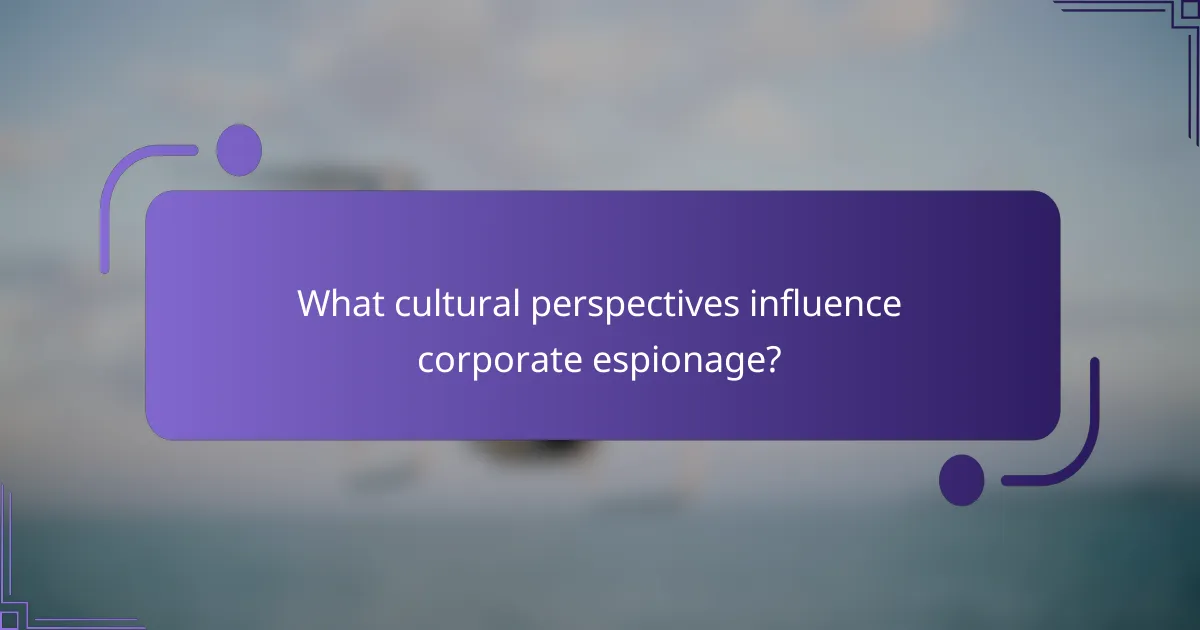
What cultural perspectives influence corporate espionage?
Cultural perspectives play a significant role in shaping attitudes toward corporate espionage, influencing how different societies perceive its ethical implications and justifications. These perspectives can vary widely, impacting the legality and acceptance of espionage practices across regions and industries.
Regional attitudes
Regional attitudes toward corporate espionage can differ dramatically. In some cultures, such as in parts of Asia, competitive intelligence gathering may be viewed as a necessary business practice, while in Western countries, it is often seen as unethical and illegal. This divergence can affect how companies operate and the strategies they employ to gain a competitive edge.
For example, in countries with a strong emphasis on collectivism, sharing information and resources may be more accepted, whereas individualistic cultures might prioritize proprietary information and intellectual property rights. Understanding these regional nuances is crucial for multinational corporations navigating global markets.
Industry norms
Industry norms significantly influence the perception and practice of corporate espionage. In highly competitive sectors like technology and pharmaceuticals, aggressive tactics for gathering intelligence may be more commonplace and even expected. Companies often justify these actions as necessary for survival and innovation.
Conversely, industries with strict regulatory frameworks, such as finance and healthcare, tend to have clearer ethical guidelines that discourage espionage. Organizations in these sectors must navigate compliance with laws like the Sarbanes-Oxley Act in the U.S. or GDPR in Europe, which can shape their approach to competitive intelligence.
Historical context
The historical context of corporate espionage reveals how past practices shape current attitudes. During the Cold War, for instance, espionage was often glorified and seen as a patriotic duty, influencing modern perceptions of corporate spying as a legitimate tactic in business warfare.
Additionally, landmark cases and scandals, such as the Enron scandal or the theft of trade secrets in the tech industry, have led to increased scrutiny and regulation. These events contribute to a growing awareness of the ethical implications and potential consequences of corporate espionage, prompting companies to reassess their strategies in light of historical precedents.

What are the legal frameworks surrounding corporate espionage?
The legal frameworks for corporate espionage vary significantly by jurisdiction, but they generally encompass laws related to intellectual property, data protection, and trade secrets. Understanding these laws is crucial for businesses to navigate potential legal risks and protect their proprietary information.
Intellectual property laws
Intellectual property (IP) laws are designed to protect creations of the mind, including inventions, designs, and brand names. In many countries, such as the United States and members of the European Union, these laws provide mechanisms for companies to safeguard their innovations against unauthorized use or reproduction.
Businesses should register patents, trademarks, and copyrights to establish their rights. Failure to do so can result in losing the ability to enforce these rights, making them vulnerable to espionage. For example, a company that neglects to patent a unique product design may find it difficult to take legal action if a competitor copies it.
Data protection regulations
Data protection regulations, like the General Data Protection Regulation (GDPR) in the European Union, govern how organizations collect, store, and process personal data. These regulations are critical in the context of corporate espionage, as they impose strict requirements on data handling and can lead to significant penalties for breaches.
Companies must ensure compliance with data protection laws to avoid legal repercussions. This includes implementing robust security measures to protect sensitive information from unauthorized access. For instance, organizations should regularly train employees on data security practices and conduct audits to identify vulnerabilities in their systems.
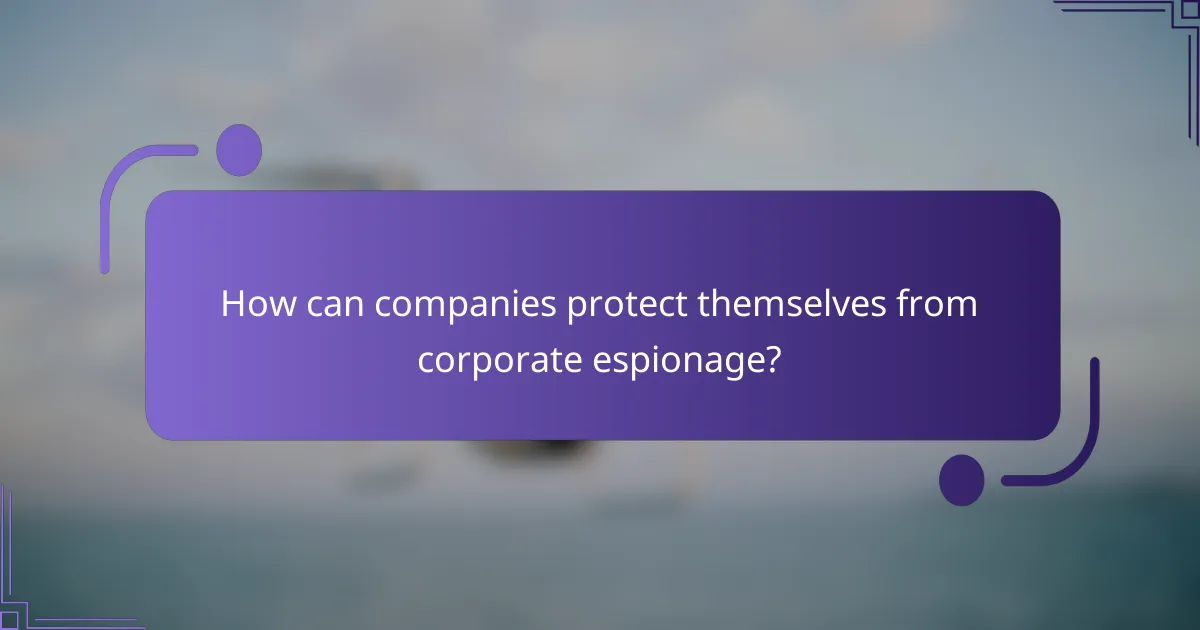
How can companies protect themselves from corporate espionage?
Companies can protect themselves from corporate espionage by implementing robust security measures, providing thorough employee training, and establishing effective incident response plans. These strategies help safeguard sensitive information and reduce the risk of unauthorized access.
Security measures
Implementing strong security measures is crucial for protecting company assets. This includes using advanced encryption for sensitive data, installing firewalls, and regularly updating software to patch vulnerabilities. Physical security, such as access controls and surveillance systems, also plays a key role in preventing unauthorized entry to facilities.
Additionally, companies should conduct regular security audits to identify and address potential weaknesses. Utilizing multi-factor authentication for accessing critical systems can significantly enhance security by adding an extra layer of protection against unauthorized access.
Employee training
Employee training is essential in mitigating the risks of corporate espionage. Regular training sessions should educate staff about the importance of data security, recognizing phishing attempts, and following best practices for information handling. Employees should be aware of the potential threats and understand their role in protecting company information.
Creating a culture of security awareness can empower employees to be vigilant and proactive. Companies may consider implementing simulated phishing exercises to test and reinforce employee knowledge, helping to identify areas that need improvement.
Incident response plans
Having a well-defined incident response plan is vital for effectively addressing any breaches of security. This plan should outline the steps to take in the event of a suspected espionage incident, including notifying relevant stakeholders and law enforcement if necessary. A clear communication strategy can help manage the situation and minimize damage.
Regularly reviewing and updating the incident response plan ensures it remains effective and relevant. Conducting drills to practice the response can prepare the team for real situations, enabling a swift and coordinated reaction to potential threats.

What are the consequences of corporate espionage for businesses?
Corporate espionage can lead to significant financial losses, legal repercussions, and reputational damage for businesses. The consequences often extend beyond immediate financial impacts, affecting long-term relationships and market positioning.
Financial losses
The financial losses from corporate espionage can be substantial, often reaching millions of dollars. Companies may face costs related to lost intellectual property, legal fees, and potential fines if found in violation of regulations. For instance, a breach could lead to a loss of competitive advantage, resulting in decreased market share and revenue.
Legal repercussions
Engaging in corporate espionage can result in severe legal consequences, including lawsuits and criminal charges. Companies caught participating in espionage may face penalties under laws such as the Economic Espionage Act in the United States, which can lead to hefty fines and imprisonment for individuals involved. Furthermore, the legal battles can drain resources and distract from core business operations.
Reputational damage
The reputational damage caused by corporate espionage can be long-lasting and difficult to repair. Businesses may lose the trust of customers, partners, and investors, leading to a decline in sales and collaboration opportunities. Negative publicity can also deter potential clients, impacting future growth and profitability.
Impact on employee morale
Corporate espionage can negatively affect employee morale and workplace culture. Employees may feel insecure about their job stability or question the ethics of their employer. This can lead to decreased productivity and increased turnover, further harming the organization.
Market position
The market position of a company can be severely compromised due to corporate espionage. If competitors gain access to proprietary information, they may quickly replicate products or services, eroding the original company’s market advantage. This shift can lead to increased competition and pressure on pricing strategies.
